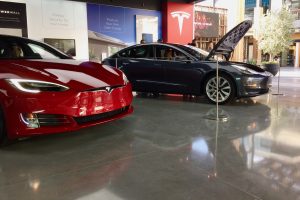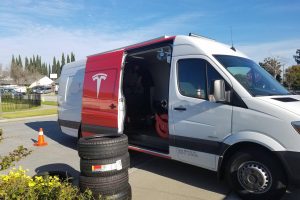Tesla’s (NASDAQ: TSLA) Battery Day outlined a roadmap for the electric car manufacturer over the next few years to reduce its battery costs by as much as 56 percent. It will take some time to achieve this milestone, according to the company’s executives during the event, but if Tesla were to achieve its goals, they might end up achieving impressive gross margins, rivaling even industry leaders like Apple.
Recently, data research and analytics firm Trefis shared a post about the electric car manufacturer and how its battery technology could enable the company to expand its lead over its competitors. As noted by the firm, the 56 percent reduction in battery costs by Tesla could raise the Automotive Gross Margins of the group by 800 basis points.
Tesla’s gross automotive margins are now leading the industry at around 21% in 2019, which was already more than 17% for Toyota. For Tesla, this was a noteworthy achievement, as the revered Japanese carmaker is already one of the most efficient automakers in the industry. In contrast, American carmaker General Motors’ automotive gross margins stood at a more modest 10 percent.
Trefis forecasts that the company will raise its automotive gross margins to 30 percent + levels if Tesla meets its battery output targets and actually lowers its costs by 56 percent. This will allow the electric car manufacturer to contend with tech giant Apple’s approximate 32 percent Hardware Gross Margins, a business that is considered a benchmark of sorts in the hardware market.
Although the battery production targets of Tesla are ambitious, the company has been trying to ensure that it is prepared to take on its optimistic ramp into the segment of cell production. Over the years, Tesla has steadily decreased its battery costs, and according to Trefis’ estimates, its innovations have enabled it to undercut the industry by about 20 percent.
Bloomberg New Energy Finance (BNEF) reports that the average cost of batteries in the industry decreased between 2016 and 2018 from $288 to $176 per kWh. Tesla’s battery costs have likely decreased from about $230 per kWh in 2016 to $127 in 2019, provided the data analytics firm’s estimates are correct. Tesla’s battery costs will then collapse from a projected $114 per kWh in 2020 to around $50 per kWh with a 56 percent cut. That’s enough for Tesla’s vehicles to reach price parity with gas-powered vehicles, and more.
Read the article by Trefis about Tesla’s gross automotive margins here.
Want to buy a Tesla Model 3, Model Y, Model S, or Model X? Feel free to use my referral code to get some free Supercharging miles with your purchase: http://ts.la/guanyu3423
You can also get a $100 discount on Tesla Solar with that code. Let’s help accelerate the advent of a sustainable future.





